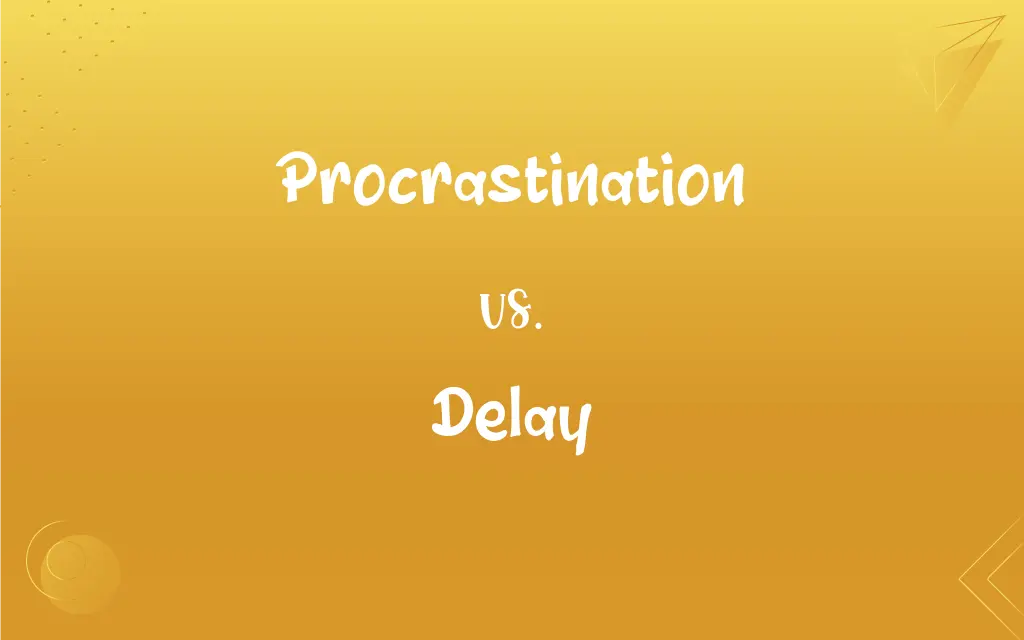Procrastination vs. Delay: What's the Difference?
Edited by Aimie Carlson || By Janet White || Published on December 2, 2023
Procrastination is the voluntary postponement of tasks despite potential negative consequences, while delay can be either intentional or unintentional postponement.

Key Differences
Procrastination involves consciously choosing to postpone tasks, often unnecessarily, due to reasons like avoidance or lack of motivation. Delay, in contrast, may occur due to external factors like unexpected obstacles or other priorities, and is not always a matter of choice.
Procrastination is often linked to personal attitudes or habits, such as a tendency to avoid challenging or unpleasant tasks. Delay, however, may stem from practical or logistical reasons, like waiting for necessary resources or information.
Procrastination is generally seen as a negative trait reflecting poor time management, while delay can be neutral or even positive, depending on the context and reason behind it. For example, strategic delays can be beneficial in certain situations.
Procrastination is typically associated with a level of self-awareness about the postponement and its potential drawbacks. Conversely, delay might not always be recognized immediately, especially when it arises from circumstances beyond one's control.
In terms of overcoming these behaviors, strategies to address procrastination often focus on improving self-discipline and motivation. In contrast, managing delay might involve better planning and addressing external challenges.
ADVERTISEMENT
Comparison Chart
Intentionality
Intentional and voluntary
Can be intentional or unintentional
Cause
Often due to avoidance or lack of motivation
Caused by external factors or practicalities
Perception
Generally viewed negatively
Can be neutral or contextually positive
Self-awareness
High level of self-awareness involved
May not involve immediate self-recognition
Management Approach
Focus on self-discipline and motivation
Involves planning and addressing externalities
ADVERTISEMENT
Procrastination and Delay Definitions
Procrastination
Habit of putting off actions or tasks to a later time.
Procrastination became his worst habit during college.
Delay
To put off to a later time; postpone.
The flight was delayed due to bad weather.
Procrastination
Voluntary deferral of tasks despite potential negative consequences.
Her procrastination in studying for exams often resulted in poor grades.
Delay
Slow or late in happening or arriving.
The delivery was delayed because of a traffic jam.
Procrastination
The action of delaying or postponing something.
He kept procrastinating on his project, which led to unnecessary stress.
Delay
To cause someone or something to be slower or late.
The unexpected roadblock delayed them on their way to the meeting.
Procrastination
Choosing to do something else instead of the task that needs to be done.
Instead of working on his essay, he procrastinated by watching TV.
Delay
A period of time by which something is late or postponed.
There was a significant delay in the project's completion due to funding issues.
Procrastination
A form of self-regulatory failure characterized by the irrational delay of tasks.
Despite knowing the deadline, his procrastination led him to start the work at the last minute.
Delay
The act of delaying; putting off.
The delay in decision-making resulted from a lack of information.
Procrastination
To put off doing something, especially out of habitual carelessness or laziness.
Delay
To postpone until a later time; defer.
Procrastination
To postpone or delay needlessly.
Delay
To cause to be later or slower than expected or desired
Heavy traffic delayed us.
Procrastination
The act of postponing, delaying or putting off, especially habitually or intentionally.
Procrastination
The act or habit of procrastinating, or putting off to a future time; delay; dilatoriness.
Procrastination is the thief of time.
Procrastination
The act of procrastinating; putting off or delaying or defering an action to a later time
Procrastination
Slowness as a consequence of not getting around to it
FAQs
Do people procrastinate intentionally?
Yes, procrastination is usually a conscious choice, though often influenced by underlying psychological factors.
How can one overcome procrastination?
Overcoming procrastination involves self-awareness, time management, and addressing underlying reasons like fear of failure.
Is procrastination always a bad habit?
Generally, yes, as it can lead to stress and poor outcomes, but sometimes it can be a symptom of deeper issues.
Does procrastination affect mental health?
Yes, chronic procrastination can negatively impact mental health, causing stress and anxiety.
Can delays be out of one’s control?
Yes, delays can often occur due to factors beyond one's control, such as environmental conditions or other people's actions.
Are all delays negative?
No, not all delays are negative. Some are necessary and can lead to better outcomes.
What causes unintentional delays?
Unintentional delays are often caused by unforeseen circumstances, such as technical failures or emergencies.
Are students more prone to procrastination?
Yes, students often procrastinate, especially in the face of uninteresting or challenging tasks.
Can delay be beneficial?
Yes, strategic delays can be beneficial, like postponing a decision to gather more information.
Can technological tools help reduce delays?
Yes, tools like project management software can help in reducing and managing delays.
Can procrastination be positive?
Rarely, as it usually leads to negative outcomes, but some argue that it can encourage thinking under pressure.
Are there industries where delays are common?
Yes, industries like construction and software development often experience delays due to various factors.
What's the difference between delay and postponement?
Postponement is a type of delay, often with a new set time or date, while delay can be indefinite.
Can procrastination be a group phenomenon?
Yes, groups can collectively procrastinate, especially if lacking clear direction or motivation.
Is delay always linked to time?
Primarily, yes, delay involves a temporal aspect, though it can also refer to slowing down a process.
Can procrastination be a symptom of a disorder?
Yes, in some cases, procrastination can be a symptom of disorders like ADHD or depression.
Can procrastination lead to creativity?
In some cases, procrastination can lead to creative solutions under pressure, though this is not generally advisable.
How do organizations deal with delays?
Organizations manage delays through contingency planning and efficient resource management.
Is procrastination related to time management?
Yes, poor time management is often a key factor in procrastination.
Does weather impact delays?
Yes, adverse weather conditions can cause significant delays in various sectors like transportation.
About Author
Written by
Janet WhiteJanet White has been an esteemed writer and blogger for Difference Wiki. Holding a Master's degree in Science and Medical Journalism from the prestigious Boston University, she has consistently demonstrated her expertise and passion for her field. When she's not immersed in her work, Janet relishes her time exercising, delving into a good book, and cherishing moments with friends and family.
Edited by
Aimie CarlsonAimie Carlson, holding a master's degree in English literature, is a fervent English language enthusiast. She lends her writing talents to Difference Wiki, a prominent website that specializes in comparisons, offering readers insightful analyses that both captivate and inform.

































































